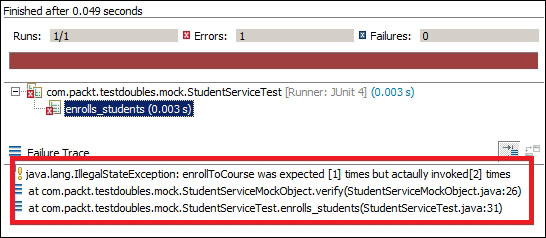A mock object is a combination of a spy and a stub. It acts as an indirect output for a code under test, such as a spy, and can also stub methods to return values or throw exceptions, like a stub. A mock object fails a test if an expected method is not invoked or if the parameters of the method don't match.
The following steps demonstrate the test failure scenario:
- Launch Eclipse, open
<work_space>, and go to the3605OS_TestDoublesproject. - Create a
com.packt.testdoubles.mockpackage and aStudentServiceclass. This class will act as a course register service. The following is the code for theStudentServiceclass:public class StudentService { private Map<String, List<Student>> studentCouseMap = new HashMap<>(); public void enrollToCourse(String courseName,Student student){ List<Student> list = studentCouseMap.get(courseName); if (list == null) { list = new ArrayList<>(); } if (!list.contains(student)) { list.add(student); } studentCouseMap.put(courseName, list); } }
- Copy the
StudentServiceSpyclass and rename it asStudentServiceMockObject. Add a new method to verify the method invocations:public void verify(String methodName, int numberOfInvocation){ int actual = invocation(methodName); if(actual != numberOfInvocation){ throw new IllegalStateException(methodName+" was expected ["+numberOfInvocation+"] times but actuallyactaully invoked["+actual+"] times"); } }
- Modify the
StudentServicecode to set the mock object, as we did in the spy example:private StudentServiceMockObject mock; public void setMock(StudentServiceMockObject mock) { this.mock = mock; } public void enrollToCourse(String courseName,Student student){ MethodInvocation invocation = new MethodInvocation(); invocation.addParam(courseName).addParam(student).setMethod("enrollToCourse"); mock.registerCall(invocation); …//existing code }
- Create a test to verify the method invocation:
public class StudentServiceTest { StudentService service = new StudentService(); StudentServiceMockObject mockObject = new StudentServiceMockObject(); @Test public void enrolls_students() throws Exception { //create 2 students Student bob = new Student("001", "Robert Anthony"); Student roy = new Student("002", "Roy Noon"); //set mock/spy service.setMock(mockObject); //invoke method twice service.enrollToCourse("english", bob); service.enrollToCourse("history", roy); //assert that the method was invoked twice assertEquals(2, mockObject.invocation("enrollToCourse")); //verify wrong information, that enrollToCourse was //invoked once, but actually it is invoked twice mockObject.verify("enrollToCourse", 1); } }
- Run the test; it will fail, and you will get a verification error. The following screenshot shows the JUnit failure output:

The Mockito framework provides an API for mocking objects. It uses proxy objects to verify the invocation and stub calls.
..................Content has been hidden....................
You can't read the all page of ebook, please click here login for view all page.
